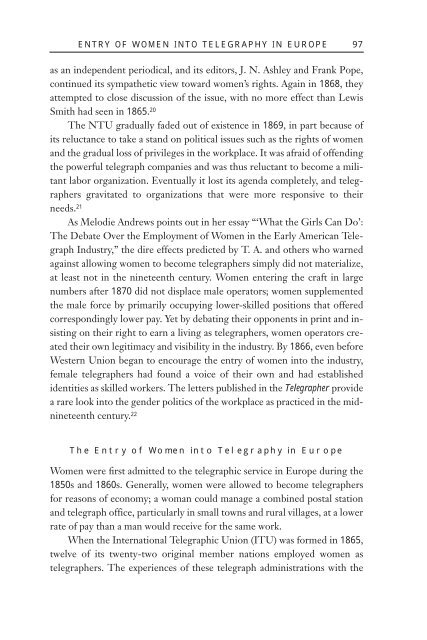My Sisters Telegraphic: Women in the Telegraph Office ... - Monoskop
My Sisters Telegraphic: Women in the Telegraph Office ... - Monoskop
My Sisters Telegraphic: Women in the Telegraph Office ... - Monoskop
Create successful ePaper yourself
Turn your PDF publications into a flip-book with our unique Google optimized e-Paper software.
ENTRY OF WOMEN INTO TELEGRAPHY IN EUROPE 97<br />
as an <strong>in</strong>dependent periodical, and its editors, J. N. Ashley and Frank Pope,<br />
cont<strong>in</strong>ued its sympa<strong>the</strong>tic view toward women’s rights. Aga<strong>in</strong> <strong>in</strong> 1868, <strong>the</strong>y<br />
attempted to close discussion of <strong>the</strong> issue, with no more effect than Lewis<br />
Smith had seen <strong>in</strong> 1865. 20<br />
The NTU gradually faded out of existence <strong>in</strong> 1869, <strong>in</strong> part because of<br />
its reluctance to take a stand on political issues such as <strong>the</strong> rights of women<br />
and <strong>the</strong> gradual loss of privileges <strong>in</strong> <strong>the</strong> workplace. It was afraid of offend<strong>in</strong>g<br />
<strong>the</strong> powerful telegraph companies and was thus reluctant to become a militant<br />
labor organization. Eventually it lost its agenda completely, and telegraphers<br />
gravitated to organizations that were more responsive to <strong>the</strong>ir<br />
needs. 21<br />
As Melodie Andrews po<strong>in</strong>ts out <strong>in</strong> her essay “‘What <strong>the</strong> Girls Can Do’:<br />
The Debate Over <strong>the</strong> Employment of <strong>Women</strong> <strong>in</strong> <strong>the</strong> Early American <strong>Telegraph</strong><br />
Industry,” <strong>the</strong> dire effects predicted by T. A. and o<strong>the</strong>rs who warned<br />
aga<strong>in</strong>st allow<strong>in</strong>g women to become telegraphers simply did not materialize,<br />
at least not <strong>in</strong> <strong>the</strong> n<strong>in</strong>eteenth century. <strong>Women</strong> enter<strong>in</strong>g <strong>the</strong> craft <strong>in</strong> large<br />
numbers after 1870 did not displace male operators; women supplemented<br />
<strong>the</strong> male force by primarily occupy<strong>in</strong>g lower-skilled positions that offered<br />
correspond<strong>in</strong>gly lower pay. Yet by debat<strong>in</strong>g <strong>the</strong>ir opponents <strong>in</strong> pr<strong>in</strong>t and <strong>in</strong>sist<strong>in</strong>g<br />
on <strong>the</strong>ir right to earn a liv<strong>in</strong>g as telegraphers, women operators created<br />
<strong>the</strong>ir own legitimacy and visibility <strong>in</strong> <strong>the</strong> <strong>in</strong>dustry. By 1866, even before<br />
Western Union began to encourage <strong>the</strong> entry of women <strong>in</strong>to <strong>the</strong> <strong>in</strong>dustry,<br />
female telegraphers had found a voice of <strong>the</strong>ir own and had established<br />
identities as skilled workers. The letters published <strong>in</strong> <strong>the</strong> <strong>Telegraph</strong>er provide<br />
a rare look <strong>in</strong>to <strong>the</strong> gender politics of <strong>the</strong> workplace as practiced <strong>in</strong> <strong>the</strong> midn<strong>in</strong>eteenth<br />
century. 22<br />
The Entry of <strong>Women</strong> <strong>in</strong>to <strong>Telegraph</strong>y <strong>in</strong> Europe<br />
<strong>Women</strong> were first admitted to <strong>the</strong> telegraphic service <strong>in</strong> Europe dur<strong>in</strong>g <strong>the</strong><br />
1850s and 1860s. Generally, women were allowed to become telegraphers<br />
for reasons of economy; a woman could manage a comb<strong>in</strong>ed postal station<br />
and telegraph office, particularly <strong>in</strong> small towns and rural villages, at a lower<br />
rate of pay than a man would receive for <strong>the</strong> same work.<br />
When <strong>the</strong> International <strong><strong>Telegraph</strong>ic</strong> Union (ITU) was formed <strong>in</strong> 1865,<br />
twelve of its twenty-two orig<strong>in</strong>al member nations employed women as<br />
telegraphers. The experiences of <strong>the</strong>se telegraph adm<strong>in</strong>istrations with <strong>the</strong>

















